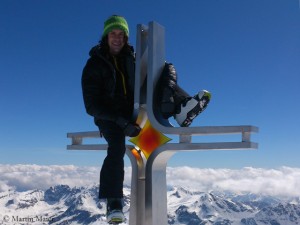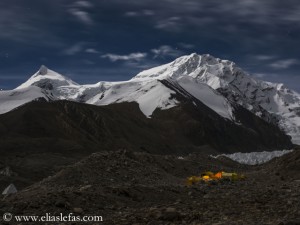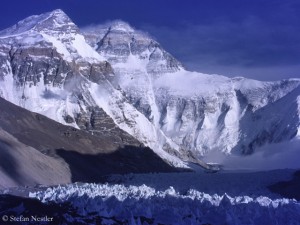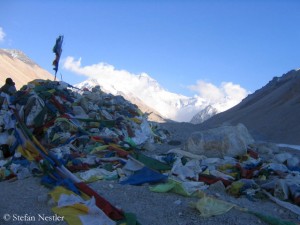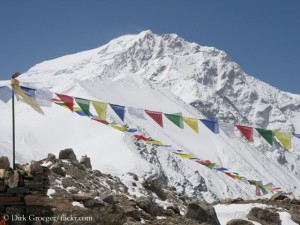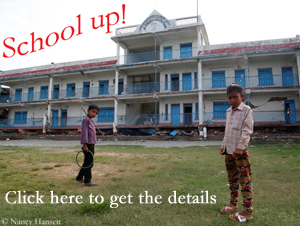Martin Maier: “Everything seemed surreal”
Survived! On 24 September, Martin Maier was swept down 600 meters by an avalanche on the eight-thousander Shispapangma in Tibet. It was not only his friend Benedikt Boehm who called it a “small miracle”, that the 39-year-old climber from Munich did not die. The avalanche had released not far below the summit. The German ski mountaineer Sebastian Haag and the Italian Andrea Zambaldi were also caught by the avalanche and, in contrast to Maier, buried by the masses of snow. Both climbers died. Boehm and the Swiss Ueli Steck were just able to rescue themselves, when the entire slope began to slip off.
Martin Maier is recovering slowly but surely from the injuries he suffered in the accident. The engineer is not a professional climber, but has already gained a lot of experience on expeditions, inter alia to the Patagonian ice cap and to some 6000ers in South America. In 2012, he climbed the 8163-meter-high Manaslu in Nepal, the eighth highest mountain in the world. Martin told me his really incredible story of survival on Shishapangma:
Martin, how are you doing now?
I still have to struggle with many aftermaths of the avalanche and the whole tragedy, with my injuries that are yet to cure. And then of course there are always the thoughts with the friends who have died.
Which injuries did you suffer?
I had a traumatic brain injury with a cerebral hemorrhage, which led to a disorder of balance and coordination. To this day, I see double, what is caused by an injury of a cranial nerve. In addition, I had ruptures in both knees and in one ankle.
You have been swept down several hundred meters by the avalanche. Do you remember anything?
I can remember up to the moment when I saw an edge of the glacier approaching at great speed. Then I lost consciousness.
Did you think about anything in those first moments of the avalanche or did you only react instinctively?
Both, but the instinct prevailed. It took time until I realized what was happening. I lost the ground under my feet and with the increasing masses of snow I felt like moving in the surf. I did not realize what was really going on. The whole thing began slowly, with a slipping, and it developed extremely fast. I could only react. Instinctively, I threw away my sticks. Then I fumbled for the buckle of my rucksack, was able to open it and threw away the rucksack too.
That may have saved your life. When the avalanche came to a halt, you were lying unconscious on the snow for hours. What did make you wake up again?
I don’t know. I woke up like after a long, deep sleep. I felt thrown back into the nothingness of my human existence, compared to the forces of nature. I could see the summit and the sun shining above.
Despite your injuries, you searched for Basti Haag and Andrea Zambaldi.
I saw equipment on the avalanche field: a stick, gloves, a rucksack. A few feet away from me, Andrea’s arm was protruding beyond the snow. At this moment I really became aware of what had happened.
Did you try to dig for your two friends?
The snow on the avalanche cone was frozen hard like concrete. I touched Andrea’s hand hoping that he was still alive. I tried to dig out his face. But it made no sense at all, the snow was rock-hard. I looked for traces leading out of the avalanche cone, to see if perhaps anyone had been able to save himself before. But that was not the case.
Did you realize at that moment that you had to save yourself and could not wait for rescue?
I had known before that I was on my own, like probably anyway at this altitude. I had seen Basti in the avalanche when it released, Andrea at the bottom. So I knew that both were definitely buried. After having lain on the avalanche for six or seven hours, I assumed that Beni and Ueli had been killed too.
Despite your injuries you were able to reach Camp 3. How far was it from the avalanche cone?
Maybe 500, 600 meters. It took a long time until I could orient myself, everything seemed surreal. I even thought about descending to the Tibetan plateau, to the area not covered by snow. But I quickly realized that it would be the wrong way for certain and that I had to find Camp 3 instead.
I was able to discover a landmark on the ridge I remembered from the ascent. I was sure that I would find our tent by walking beyond that landmark. I was not walking normally. I got up, fell down, tried to get back on my feet, crawled. My mind was working, but my body did not obey.
Did you meet your teammates in Camp 3?
No. The tent was badly damaged by the storms of the past few days. We had pitched the tent during our first summit attempt and had not stayed there during our second try. The tent was torn, inside half a meter of snow. I scooped it out with my hands. Completely exhausted, I fell into the tent and fell asleep again. At night I woke up because I was cold. I had no sleeping bad, no torch, no lighter, nothing to drink. In the morning, after I had made it through the night in reasonably good condition, I tried to descent by my own. But as I stepped out of the tent, I immediately fell down a few meters. I was just glad that I had not slipped off the ridge. I realized that I had to rest before the next try. I sat down in the tent, then I found a lighter and melted snow for drinking. At about 10 a.m. Norbu Sherpa arrived. He had climbed up all the way from basecamp and shouted from a distance whether anyone was there. I was very happy to see him.
How do you deal with your dramatic experience? Do you ponder on it day and night?
No. I have come to terms with it, as far as possible. I have no nightmares or lingering memories. Of course, I’m giving thought of it. Daily I’m forced to deal with it because the insurances want information or friends call me, who want to know what happened. Although this phase is very exhausting, I am able to handle the tragedy. I have always been aware of the dangers of mountaineering, and what has happened, is very sad, but it’s probably part of this sport.
Do you also see it as a small miracle that you survived?
I am well aware that I was very lucky. I had a guardian angel that made sure that I came to rest on the avalanche and was not buried after I had lost consciousness. But the rest was my own struggle for survival, against the forces of nature. After I had woken up, I went back for my own. I survived the cold and all ordeals. Those were my own efforts.
On the other hand, I feel a deep gratitude to all the people who have helped me in this situation: Thomas Kaempf who climbed from base camp to a mountain opposite to get a view on the avalanche cone. He saw that someone was moving towards Camp 3 and thus encouraged the many helpers. Suzanne Huesser, who coordinated the rescue from below. Above all Norbu, who climbed up to me. And Carlos Martinez, the Spanish expedition doctor who gave me medical treatment during the descent from Camp 2. I do not know how to thank all the people.
You have nearly died, will you be the same when you will return to the mountains?
I don’t know. Due to the injuries, I still had no opportunity to go to the mountains. But of course, the avalanche was a dramatic experience. I can imagine that I will experience many things more intense and more consciously.
But you won’t give wide berth to the mountains?
Definitely not!
Will you celebrate your birthday twice a year now?
No, I have only one. (laughs)



